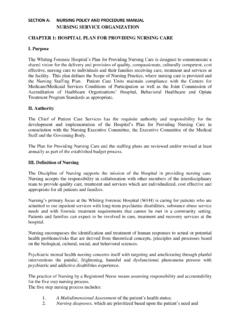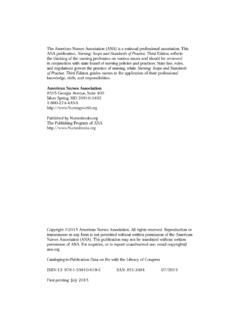Transcription of The Process of Cultural Competence in the Delivery of ...
1 181 JOURNAL OF TRANSCULTURAL NURSING / JULY 2002 Campinha-Bacote / Process OF Cultural COMPETENCEThe Process of Cultural Competence in theDelivery of Healthcare Services:A Model of CareJOSEPHA CAMPINHA-BACOTE, PhD, RN, CNS, BC, CTN, FAANT ranscultural models of service care Delivery have emerged to meetthe challenges of providing health care to our growing multi-ethnic world. This article will present Campinha-Bacote smodel of Cultural Competence in health care Delivery :TheProcess of Cultural Competence in the Delivery of Health-care Services. This model views Cultural Competence as theongoing Process in which the health care provider continu-ously strives to achieve the ability to effectively work withinthe Cultural context of the client (individual, family, commu-nity).
2 This ongoing Process involves the integration of cul-tural awareness, Cultural knowledge, Cultural skill, culturalencounters, and Cultural OF THE MODELThe changing demographics and economics of a growingmulticultural world and the long-standing disparities in thehealthstatusofpeoplefromdiverseethnic andculturalback-groundshaschallengedheal thcareproviderstoconsidercul-tural Competence as a priority. Campinha-Bacote s model ofculturalcompetenceinhealthcaredelivery isonemodelthathealth care providers can use as a framework for Process of Cultural Competence in the Delivery ofHealthcare Services(Campinha-Bacote, 1998a) is a modelthat views Cultural Competence as the ongoing Process inwhichthehealthcareprovidercontinuously strivestoachievethe ability to effectively work within the Cultural context ofthe client (individual, family, community).
3 This modelrequireshealthcareproviderstoseethe mselvesasbecomingculturally competent rather than already being culturallycompetent. This Process involves the integration of culturalawareness, Cultural knowledge, Cultural skill, culturalencounters, and Cultural of the Model1. Cultural Competence is a Process , not an Cultural Competence consists of five constructs: culturalawareness, Cultural knowledge, Cultural skill, Cultural en-counters, and Cultural There is more variation within ethnic groups than across eth-nic groups (intra-ethnic variation).4. Thereisadirectrelationshipbetweentheleve lofcompetenceofhealthcareprovidersandthe irabilitytoprovideculturallyresponsive health care Cultural Competence is an essential component in renderingeffective and culturally responsive services to culturally andethnically diverse ANTECEDENTSThe developmental stages of this model began back in1969, ,therewasunrest and conflict in the area of race relations.
4 It was second-generation Cape Verdean and raised in an exclu-sively Cape Verdean community, Campinha-Bacote, foundherself not fitting in either group. This is when she beganexploring the area of Cultural and ethnic groups. Completingher baccalaureate, master s, and doctoral degrees in nursing,she extended her interest in Cultural groups to the fields oftranscultural nursing and medical anthropology. Her clinicalbackground as a psychiatric nurse also led her to explore thefield of multicultural counseling. It is the blending of Process ofCultural Competence in the Delivery of Healthcare Servicesmodel blends the fields of transcultural nursing, medicalanthropology, and multicultural counseling.
5 The works ofLeininger (1978) in the area of transcultural nursing andJournal of Transcultural Nursing,Vol. 13 No. 3, July 2002 181-184 2002 Sage Publications at VANDERBILT UNIV on October 29, from Pedersen (1988) in the area of multicultural developmentwere combined to develop the constructs used in the OF THECONSTRUCTS OF THE MODELT hemajorconstructsofthemodelThe Process of CulturalCompetence in the Delivery of Healthcare Servicesare cul-tural awareness, Cultural knowledge, Cultural skill, culturalencounters, and Cultural desire. To fully understand thismodel, each construct will be defined and AwarenessCultural awareness is the self-examination and in-depthexploration of one s own Cultural and professional sbiases,prejudices,andassumptionsaboutin dividualswhoarediffer-ent.
6 Without being aware of the influence of one s own cul-tural or professional values, there is risk that the health is the tendency of an individual to impose their beliefs,values, and patterns of behavior on another culture(Leininger, 1978). Cultural KnowledgeCultural knowledge is the Process of seeking and obtain-ingasoundeducationalfoundationabo utdiverseculturalandethnic groups. In obtaining this knowledge base, the healthcare provider must focus on the integration of three specificissues:health-relatedbeliefsandc ulturalvalues,diseaseinci-dence and prevalence, and treatment efficacy (Lavizzo-Mourey, 1996). Obtaining Cultural knowledge about the cli-ent sworldviewwillexplainhowhe/she interprets his/her illness and how it guides his thinking,doing, and incidence and prevalence among ethnic groups isthe second issue the health care provider must address concerning the field of biocultural ecology.
7 Diseaseincidence varies among ethnic populations, and health careproviders who do not have accurate epidemiological data toguidedecisionsabouttreatment,healthedu cation,screening,and treatment programs will not be able to positively address in the Process of obtaining Cultural involves obtaining knowledge in such areas as ethnicpharmacology. Ethnic pharmacology is the study of varia-tions in drug metabolism among ethnic groups. In obtainingculturalknowledge,itiscriticalt orememberthatnoindivid-ualisastereotypeo fone scultureoforiginbutratherauniqueblend of the diversity found within each culture, a uniqueaccumulationoflifeexperiences,andt heprocessofaccultur-ation to other cultures.
8 Therefore, the health care providermustdeveloptheabilitytoconductac ulturalassessmentwitheach SkillCultural skill is the ability to collect relevant Cultural dataregarding the client s presenting problem as well as accu-rately performing a culturally based physical Process involves learning how to conduct culturalassessments and culturally based physical (1978)definedaculturalassessmentasa system-atic appraisal or examination of individuals, groups, andcommunitiesastotheirculturalbeliefs,v alues,andpracticesto determine explicit needs and intervention practices withinthe context of the people being served (pp. 85-86). Culturalskill is also required when performing a physical how a client s physical, biological, and physiologicalvariations influence her ability to conduct an accurate andappropriate physical evaluation.
9 Examples include differ-encesinbodystructure,skincolor,vi siblephysicalcharacter-istics, and laboratory EncountersCultural encounter is the Process that encourages thehealthcareprovidertodirectlyengageinc ross-culturalinter-actions with clients from culturally diverse refine or modify one s existing beliefs about a culturalgroup and will prevent possible stereotyping that may haveoccurred. However, health care providers must be aware thatinteracting with just three or four members of a specific is possible that these three or four individuals may or maynotrepresentthestatedbeliefs,values,o rpracticesofthespe-cific Cultural group encountered by the health care ,whichmeansthatthereismore variation within a Cultural group than across encounters also involve an assessment of the cli-ent s linguistic needs.
10 Using a formally trained interpretermay be necessary to facilitate communication during theinterview Process . The use of untrained interpreters, friends,or family members may pose a problem due to their lack ofknowledge regarding medical terminology and disease DesireCulturaldesireisthemotivationofthe healthcareprovidertowantto, rather thanhaveto, engage in the Process ofbecomingculturallyaware,culturallyknow ledgeable,cultur-ally skillful, and familiar with Cultural encounters. Culturaldesire involves the concept of caring. It has been said that182 JOURNAL OF TRANSCULTURAL NURSING / JULY 2002 at VANDERBILT UNIV on October 29, from people don t care how much you know, until they first knowhow much you care (Campinha-Bacote, 1999).







